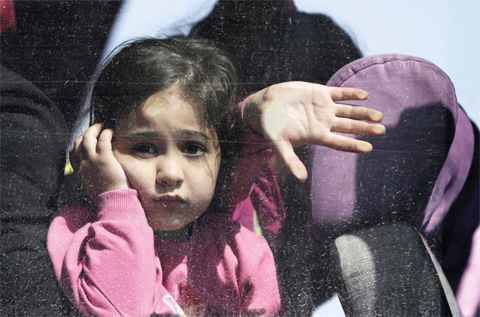MOSCOW: It started with a morning knock on the door just days into Russia’s mobilization drive in September 2022. Maria Semyonova’s boyfriend was handed his draft papers while she was still waking up. After getting six weeks of training, he has been fighting in Ukraine ever since. “I remember that day like it was yesterday,” said the 26-year-old Moscow resident, her body stiffening at the memory. “I was just shaking,” Maria said.
Unable to focus, she took a week off work and eventually resigned from her job. As the second anniversary of the Ukraine conflict looms, the female relatives of Russia’s mobilized men are becoming more and more outspoken in calling for their loved ones to come home. Their pickets and impassioned appeals have gained traction on social media and the sensitive issue is becoming a difficult one for the authorities to ignore entirely or deal with heavy-handedly.
Semyonova has written multiple appeals to President Vladimir Putin and other officials — all to no avail. One day in December, wrapped up in a white scarf, she laid white carnations at the Tomb of the Unknown Soldier by the walls of the Kremlin in an act of protest together with 10 other women. “I love him. I can’t just abandon him,” she said. When he came back for his first leave, she found her boyfriend “tougher” than usual. On his second leave, he was drunk half the time and was having nightmares about the campaign.
‘Nobody is listening’
Various social media groups for the relatives of mobilized soldiers have sprung up in recent months. One of them, a Telegram channel called “The Way Home”, has over 38,000 followers. Their activism is largely ignored by state media but is a sensitive issue for the Kremlin which is keen to project an image of national unity around Putin ahead of his inevitable re-election in a vote in March.
“We’re not being heard by our government, by our television stations, nobody is listening to us,” said Alexandra, a 34-year-old cook living in the Murmansk region in the far north of Russia. “But I can’t not do this,” said the 34-year-old pregnant mother of two, who moved to Russia from eastern Ukraine with her husband, a miner, in 2018. He was mobilized in Oct 2022 — shortly after Putin announced a partial mobilization that led to angry protests and a wave of emigration of young men.
‘Everything collapsed’
More than 300,000 men were called up in the end and there is still no indication of when they might return as the conflict grinds on. The salary for mobilized men of around 200,000 rubles (2,000 euros) a month is high for Russia — at least outside the capital.
But the families say a lot of the money goes on extra kit to supplement what the army provides them with and there are extra childcare costs to factor in. The burden is difficult for many women. Antonina, 41, said she had to leave her job and started going to a therapist after her partner was called up.
She has gained 25 kilos (55 pounds) and suffered a micro stroke. “Everything collapsed,” she said. “I try not to watch the news because I know where he is ... I just wait for his calls,” she said.
She said her partner, who is suffering from a peptic ulcer, is being sent out on assaults with other sick and injured men even though they should not be fighting. Nevertheless, Antonina and other women said they were opposed to a second wave of mobilization even if that was the only way for their loved ones to come back. “I don’t want anyone else to go through what I’m going through,” she said.
“The Way Home” has now published a manifesto declaring mobilization illegal since Russia has not officially declared war and is conducting what it officially refers to as a “special military operation”. While none of the three women that AFP spoke to said they had faced any legal consequences due to their activism, they know they are treading a thin line in a country where dissent over the conflict is increasingly punished. “I’m scared my husband will be killed for what I’m doing. I’m scared my children will be sent to an orphanage, that I’ll be imprisoned,” said Alexandra, who is expecting their third child in March.
‘A terrible mistake’
AFP has withheld details about the women and their partners because of their concerns about possible repercussions. They all said they had received violent rhetoric online — from both supporters and opponents of Russia’s campaign in Ukraine.
Alexandra said that in the place where she lives “I am alone in my struggle” and many friends have turned against her. But she said she had no intention of giving up. “I just want this nightmare to end. People should not kill each other. “We have made a terrible mistake. Our whole country has and I really want people to realize that and for there to be peace.” — AFP











